WEP 2023 takes success to the edge
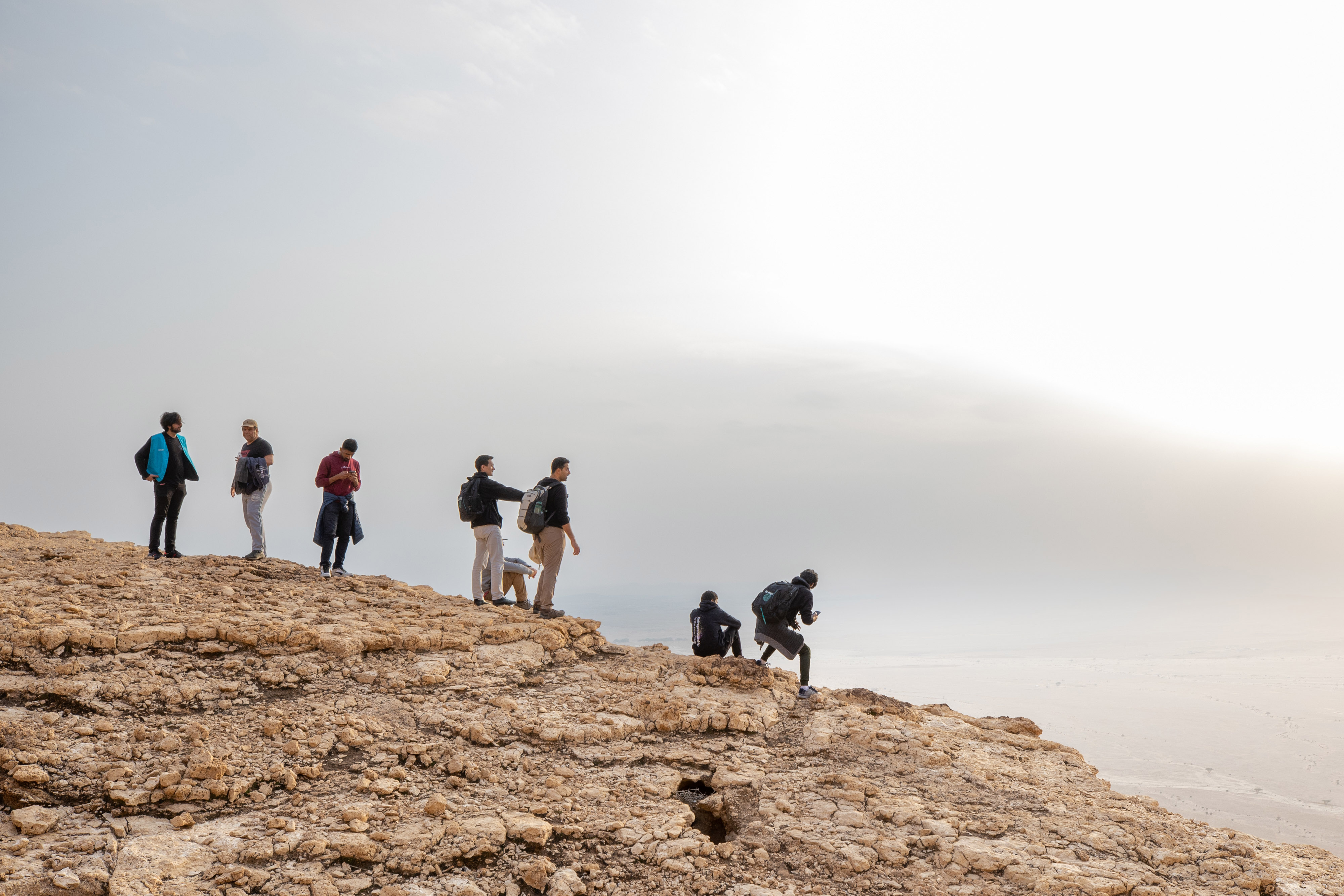
As part of WEP23, KAUST’s Winter Enrichment Program, students embodied the theme of “Edge” with a road trip to the “Edge of the World” in northwest Riyadh. The spectacular rock formations and cliffs give stunning views to the valley below and surrounding desert landscape. Photo: KAUST
What do black holes, renewable energy, extreme sports, artificial intelligence and jazz music have in common? WEP2023! These are among the diverse topics presented as part of the King Abdullah University of Science and Technology (KAUST) Winter Enrichment Program, held January 8 – 19 on the university campus and offered virtually to audiences around the world.
This year's theme, Edge — transform the world you know, explores how borders are broken collectively and individually by risk-takers across a broad spectrum of spheres in areas such as the sciences, arts, outdoor adventure and entrepreneurship "to understand how we ignite our individual confidence to step into the unknown, and the outcomes of that transformative journey on ourselves and the world around us."
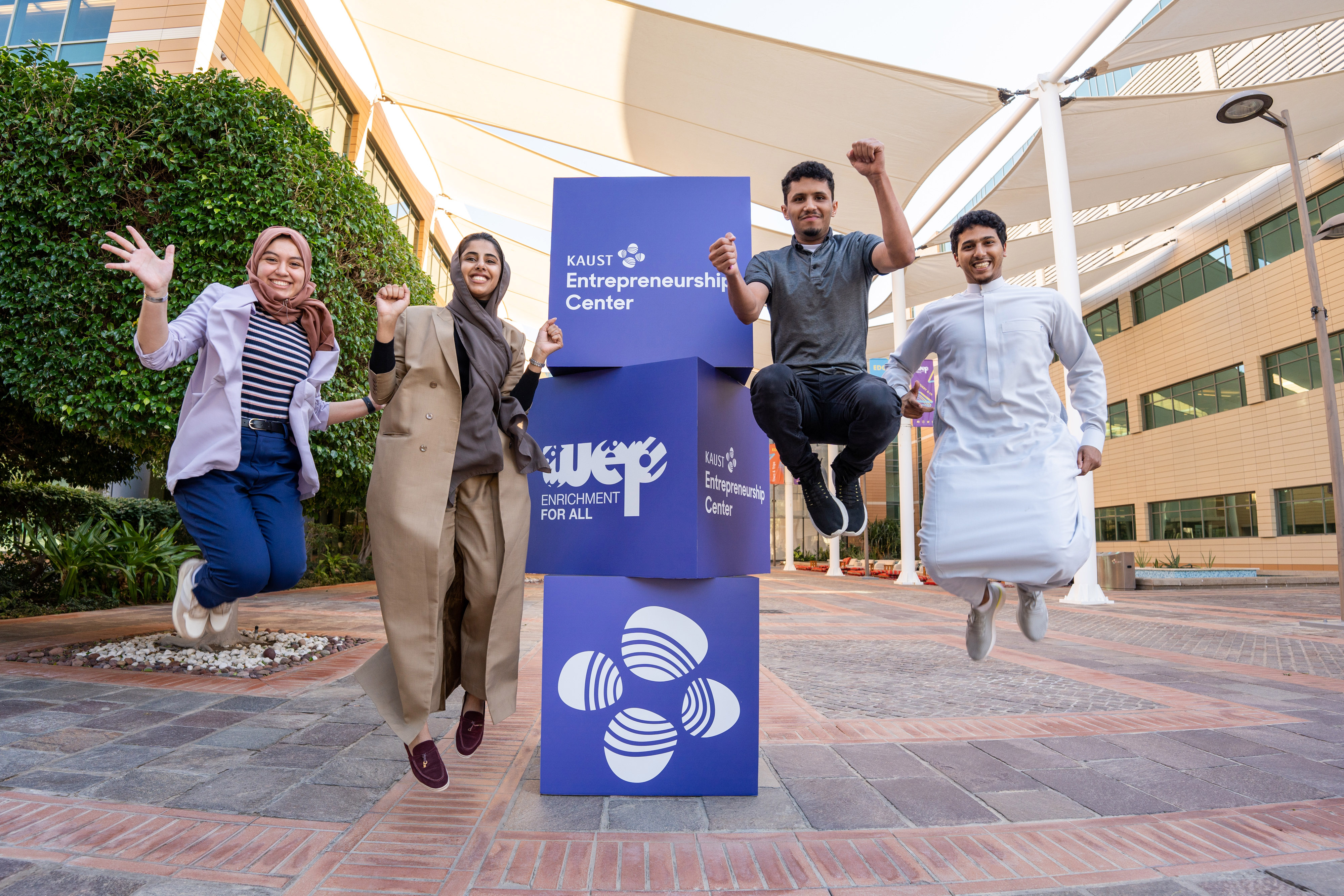
KAUST students jump for joy in a playful moment during WEP23. Photo: KAUST
KAUST has been offering WEP programs to its community and visitors since 2012. Guided by the motto, "enrichment for all," the precept is that access to a wide range of subject experts, stimulating ideas and hands-on activities inspires engagement, furthers knowledge, boosts motivation and encourages leadership. This is the real value of enrichment programs, and what helps make KAUST an exceptional university community.
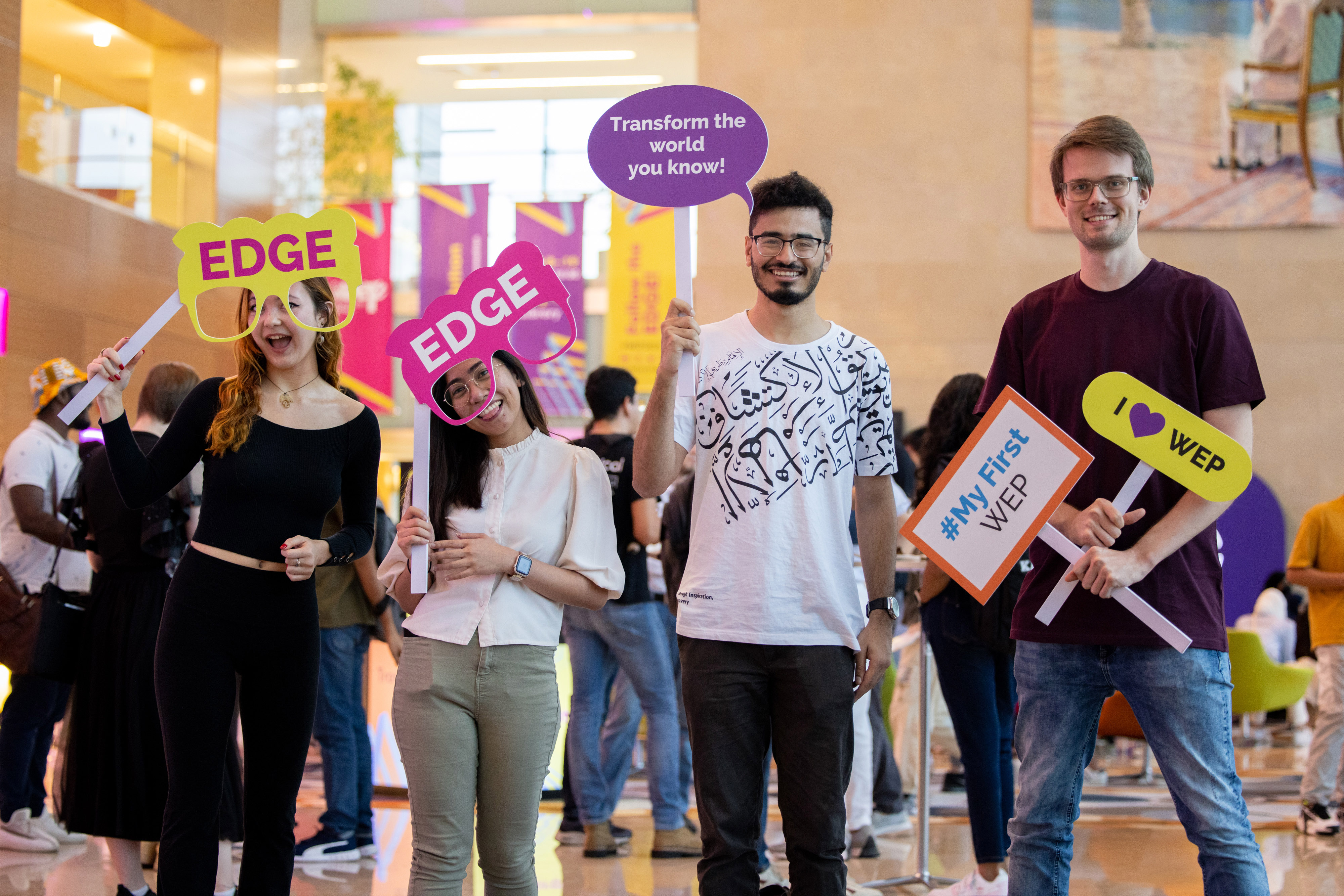
KAUST students have fun posing with WEP props. Photo: KAUST
KAUST students, faculty, visitors and children of all ages attended the ambitious lineup of activities, which took place in nearly every area of campus, from the library, auditorium and classrooms to the harbor, cinema and beach, with additional activities offered off campus, including diving in the Red Sea and hiking in Riyadh.
Welcoming words
In her opening welcome remarks, Samia Falimban, director of Office of Culture, Enrichment and Engagement at KAUST, set the tone for WEP by citing a verse from the Arab poet Aboul-Qacem Echebbi, which encapsulates the spirit of the Edge theme:
أُبَارِكُ في النَّاسِ أَهْلَ الطُّمُوحِ وَمَنْ يَسْتَلِـذُّ رُكُوبَ الخَطَـر
وَأَعْلَنَ في الْكَوْنِ أَنَّ الطُّمُوحَ لَهِيبُ الْحَيَـاةِ وَرُوحُ الظَّفَـر
I bless ambitious and inspiring souls, holding dear the ones who brave danger,
announcing this truth to the whole universe.
Aspiration is the flame of life and the spirit of victory.
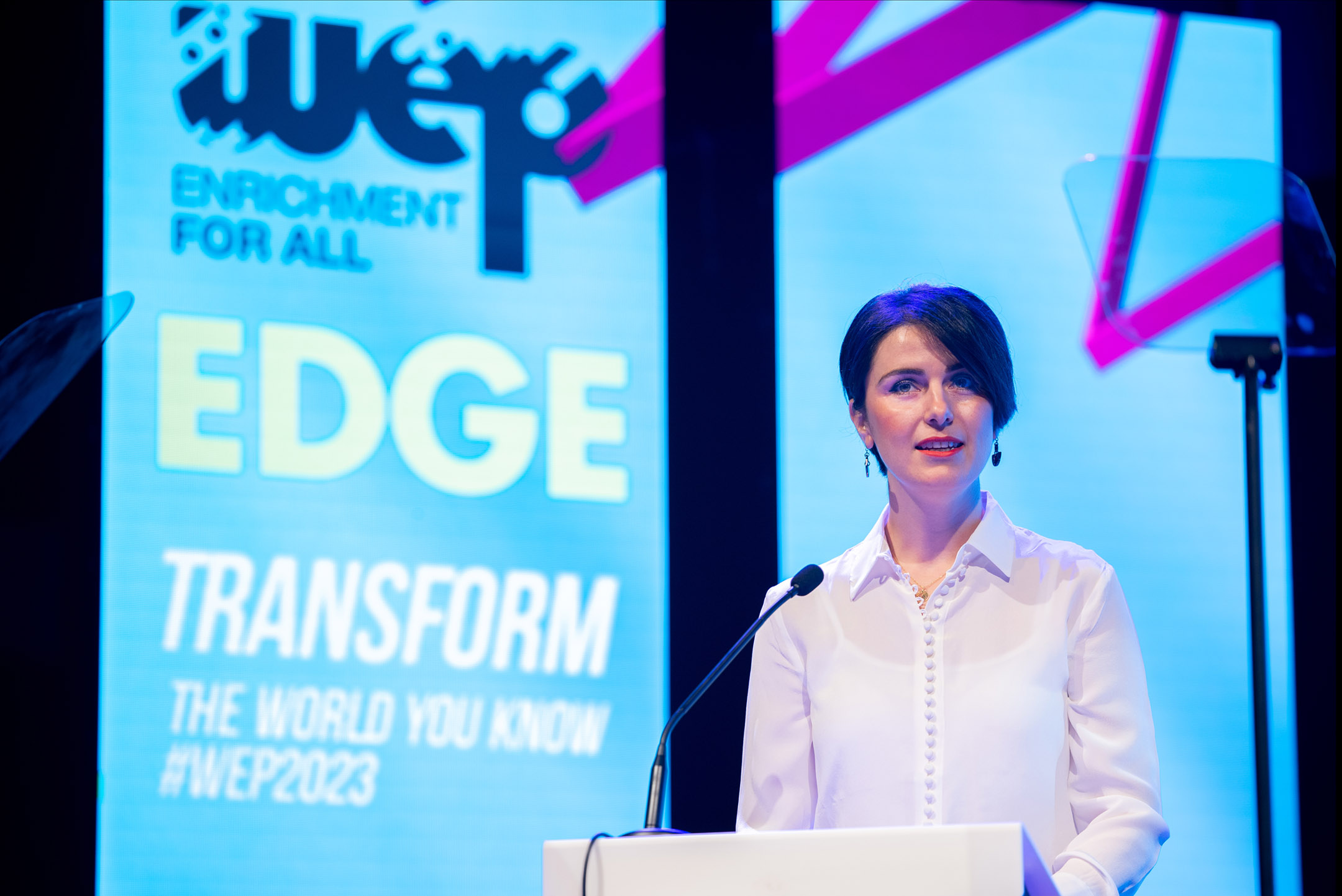
WEP23 Chair Derya Baran primed audiences for what they could expect at this year's event. Photo: KAUST
WEP chair and organizer
Derya Baran, associate professor of material science and engineering related these words and the Edge theme of "going beyond" to her personal experience, saying that she discovered her edge by branching out from academia to enter entrepreneurship with the startup,
RedSea. "Every time I think I have reached my limits I realize there is more to discover. [Edge] is a driving theme of my life," Baran said.
The United Nations Sustainable Development Goals (SDGs) were included in the WEP design process from the beginning, and each event supported an SDG in some way.
Baran added that, in the face of unimaginable challenges in the world such as climate change, disease, conflict and inequality, we must look ahead and transform the world we know together: "Asking difficult questions of ourselves and others and seeking answers, as we are doing within WEP, offers paths of discovery, along which we must unite."
All-star lineup: highlights
As most any WEP participant can attest, the biggest challenge about the event was deciding what to see! With more than 130 activities and 86 speakers scheduled from morning to night across two-weeks, it was near impossible to experience it all. From the cerebral to the physical to the sublime, there was something for everyone. Keynote lectures, panel discussions, art exhibits, robotics games, cooking workshops, live music, nature workshops, farmers markets, improv performances and adventure outings were among the many events that kept attendees curious and engaged.
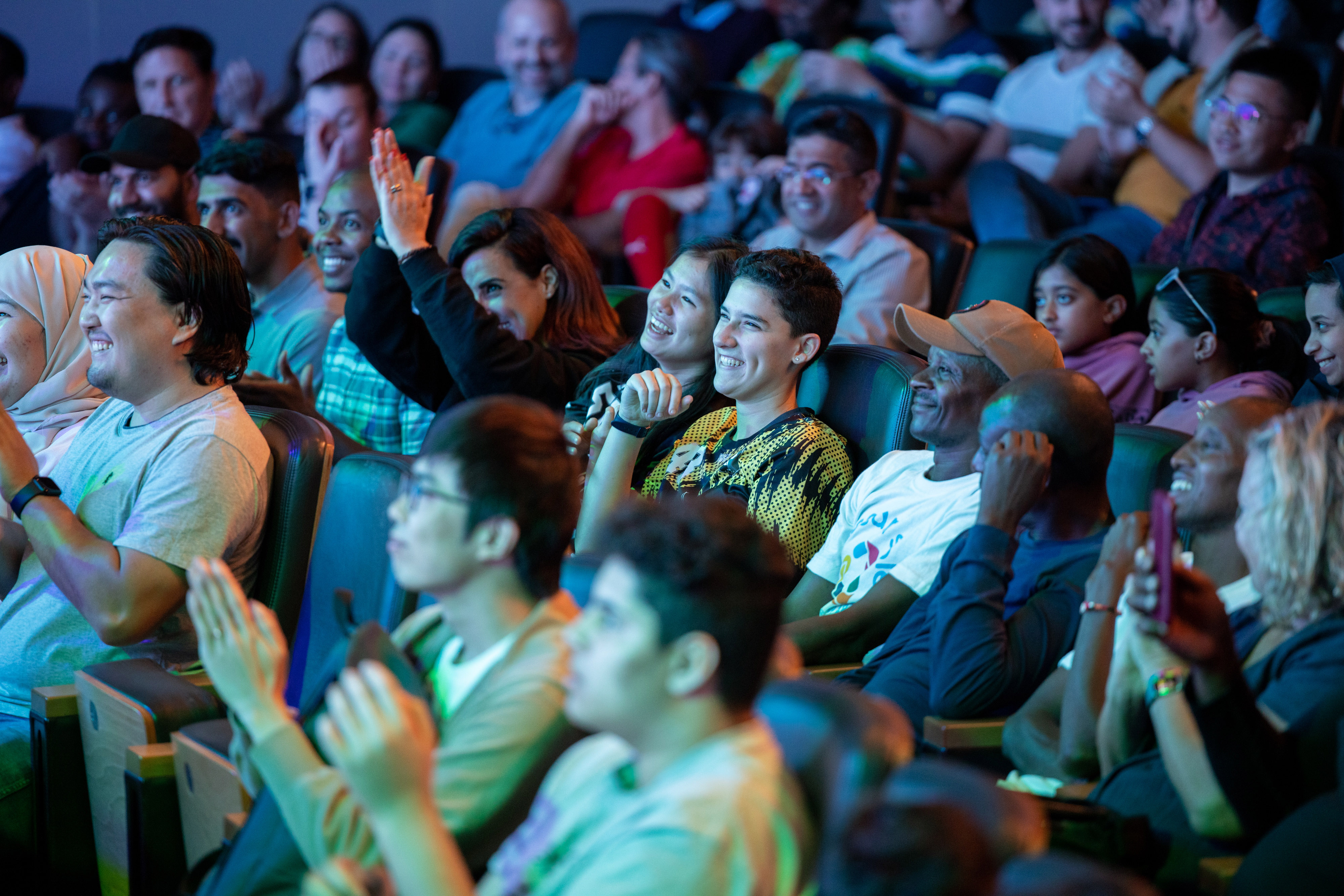
WEP23 delighted audiences with its ambitious lineup of compelling speakers and activities. Photo: KAUST
Master of Science bioengineering student Amal Alhelal was among the KAUST students who participated. She said that WEP was meaningful to her for so many reasons. "I found the keynote talks to be fascinating and informative, like the presentation on black holes (Feryal Ozel) and deep space (Paul Sutter), and the machine learning workshops were especially helpful to my field," Amhelal said. "I like that the subjects were varied and not all scientific, which helps students remember that other parts of life are also important, like hiking, diving and adventure."
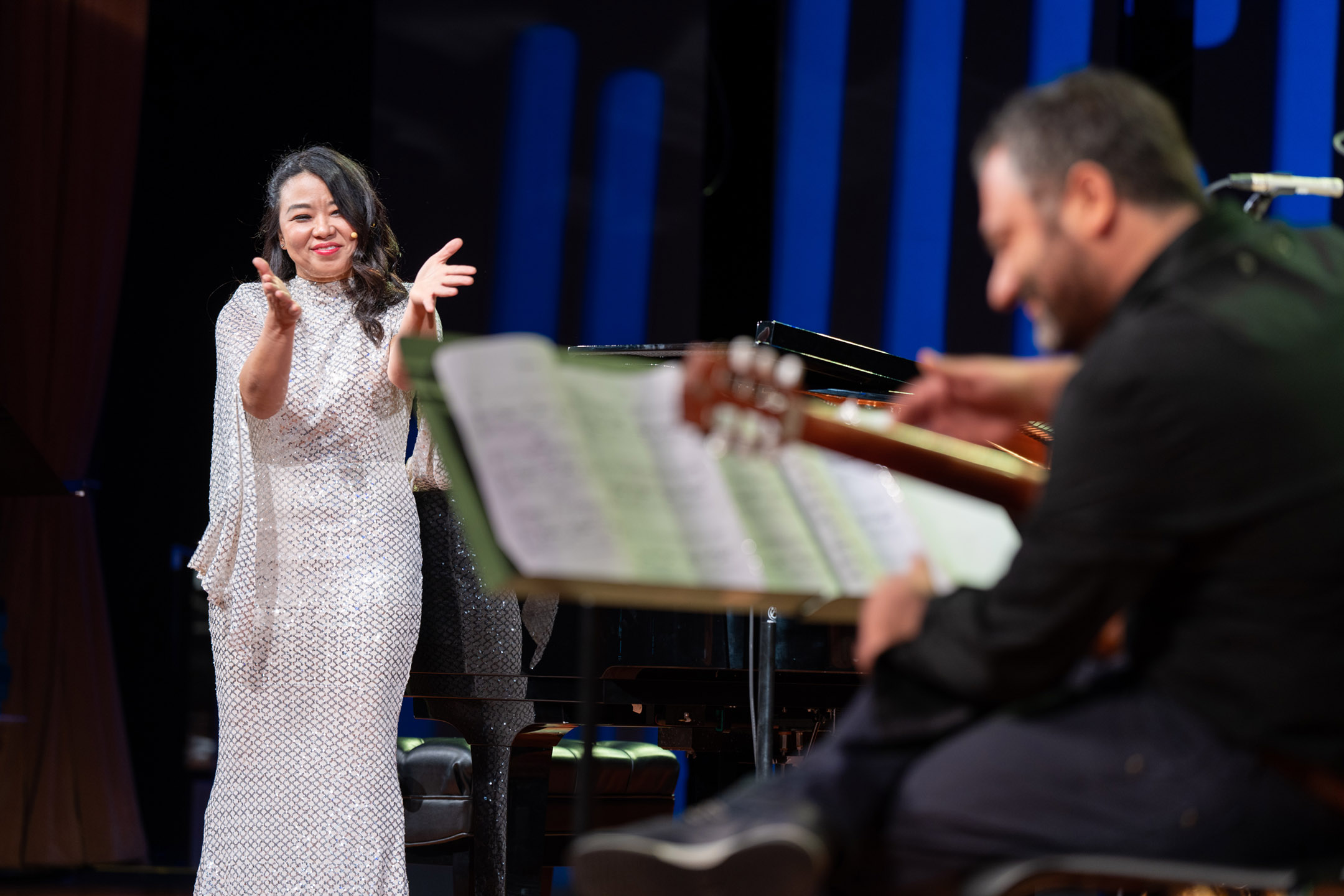
The Mavis Pan Quintet uplifted audiences with jazz infused music across styles, from swing to bossanova to R&B to tango, with a repertory of love songs set to lyrics by KAUST's own David Keyes, professor of mathematics and computational sciences. Photo: KAUST
The line-up of
distinguished keynote speakers included world-renowned personalities alongside local talent.
Coined by Time magazine as the "Leader of the Bionic Age,"
Hugh Herr, professor of Media Arts & Sciences at the MIT Media Lab and co-director of the MIT Center for Bionics, is known for pioneering bionic technologies that expand mobility and capability for humans with limitations and disabilities, "from the protein scale to the organismal scale." A double amputee, Herr said the genesis behind his current work came about as a result of designing prostheses for himself. He spoke of a future world where disability would be no more — "technology can bridge the chasm between human disability and human potential" — and shared inspirational footage of other amputees whose bionic limbs are restoring their movement patterns and helping them lead normal, healthy lives.
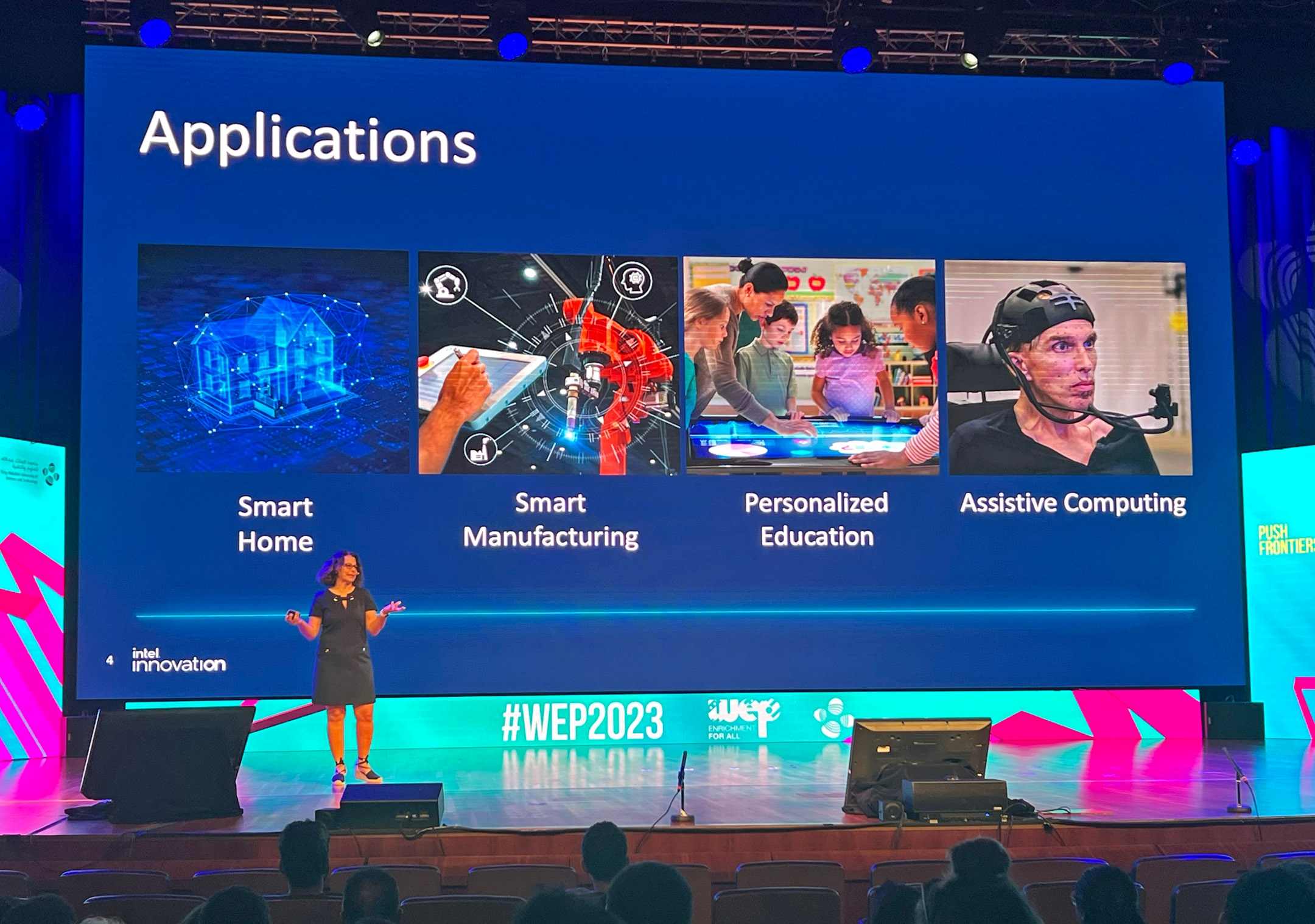
In her talk, Human and AI: changing the narrative from competition to collaboration, luminary Lama Nachman, director of Human and AI Systems at Intel, painted a future where the best strengths of humans and machines achieve integrative solutions for smart applications in areas such as manufacturing, education, computing and homes. Among her accolades, Nachman is known for her work with physicist Stephen Hawking, having outfitted him with AI-devices that enabled him to continue his work and communicate with the world. Photo: JWest / KAUST
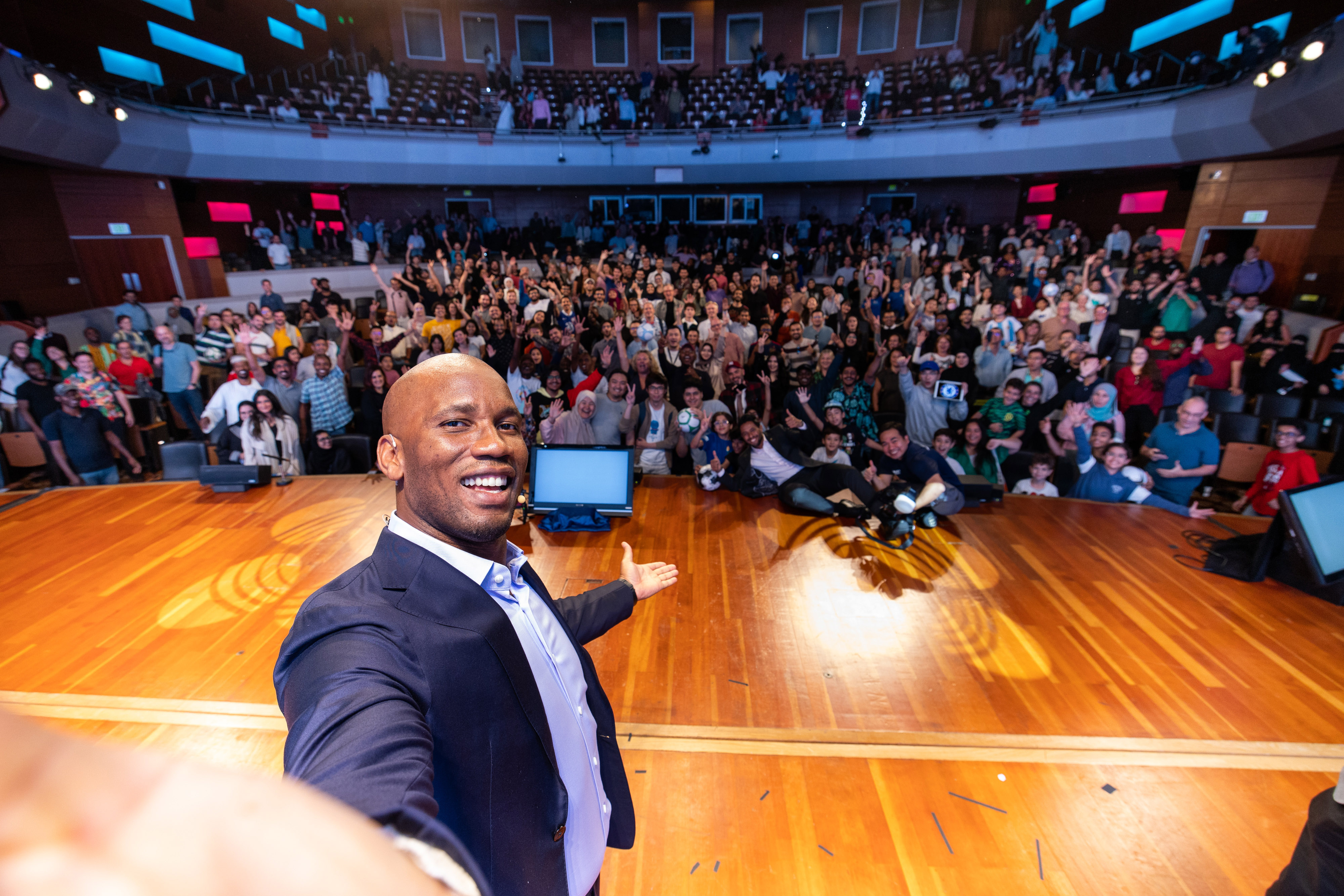
Professional retired footballer Didier Drogba snaps a selfie with the KAUST audience at WEP23. Photo: KAUST
Professional retired footballer Didier Drogba wowed crowds with charisma and inspiration. Considered to be a "Champion for Peace" in his native Côte d'Ivoire, the top scoring, former captain of the Ivory Coast national football team spoke from personal experience about how he was able to push the physical boundaries of success and overcome obstacles and hardships to become one of the most famous and respected footballers in the world. The athlete went on to form the
Didier Drogba Foundation, a charity in Africa that facilitates resources such as healthcare and education to underserved populations.
Seeing Didier Drogba was a highlight for Mahdi Alshoyokh, a PhD student studying bioscience in Jesper Tegner's Living Systems Laboratory who said he had been a Chelsea football fan. "I like Didier's approach in life of using what he accomplished in his career to help people," he said. "I didn't know that he started a charity until I saw him here at KAUST. Hearing this confirmed my respect."
This was the fourth WEP that Alshoyokh attended. When asked how he chose which events to attend given the incredible diversity of offerings, he said, "I wanted to branch out and choose topics that weren't necessarily science focused," adding that a 3D printing food workshop and talk by freediver Sofia Gomez Uribe were also standout experiences.
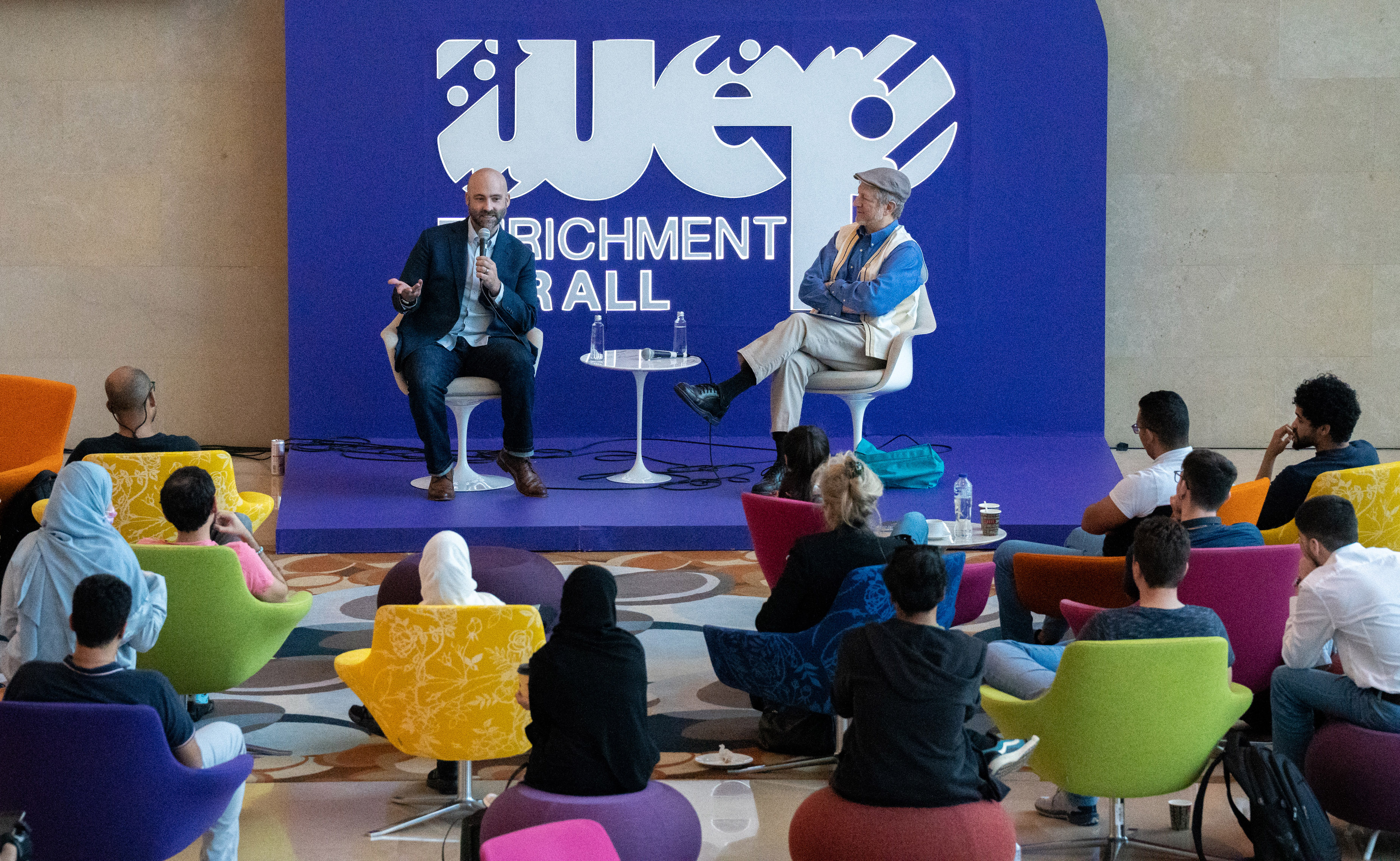
Theoretical cosmologist Paul Sutter (left), researcher at Stony Brook University, New York and host of the podcast, Ask a Spaceman, shown here with KAUST Professor and WEP Moderator David Keyes (right), expanded minds in a presentation and Q&A covering topics such as anti-gravity, the metaverse, dark energy and the edge of the universe. Spoiler alert: "As far as scientists can tell, the universe is going to rip itself apart." Photo: KAUST
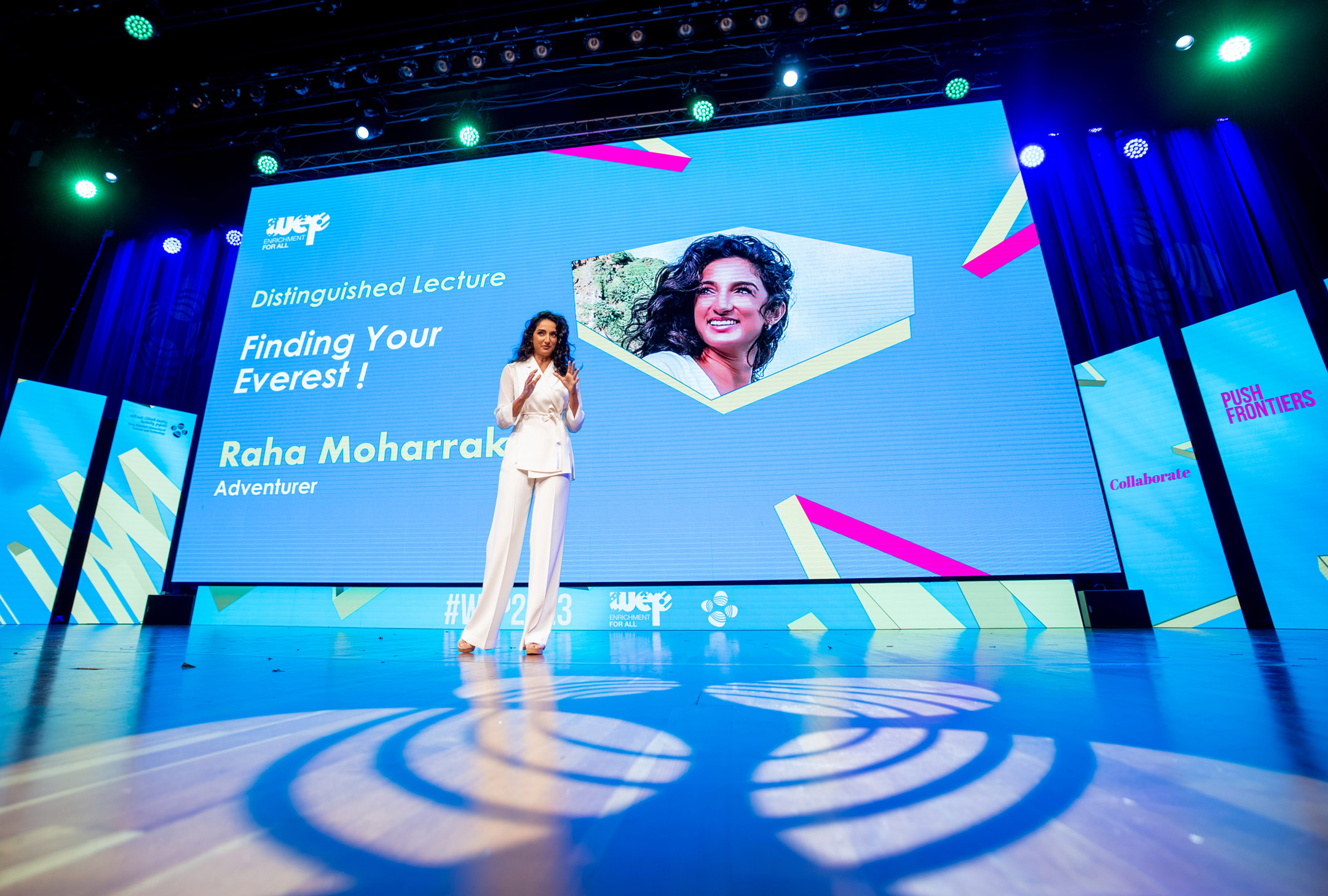
Raha Muharraq, the first Saudi woman and youngest Arab to reach the summit of Mount Everest, uplifted WEP23 participants with her lecture. Photo: KAUST
Female adventurers impressed audiences with their perseverance to tackle the impossible, including Jeddah-born Raha Muharraq for being the first Saudi woman and youngest Arab to reach the summit of Mount Everest, and achieve the "Seven Summits Challenge" for climbing the highest mountain on each continent; and Norwegians Hilde Fålun Strøm and Sunniva Sorby for being the first women in history to over-winter solo in Svalbard, Norway. The Arctic Archipelago is the northernmost inhabited area in the world, known for extreme temperatures, snow and wind, and for being a destination for outdoor adventurers seeking a wilderness challenge.
Chief Executive Officer and Chief Technology Officer
Peter Rawlinson of Lucid, a leader in the electric vehicle manufacturing industry, spoke about the future of sustainable mobility. "We owe it to this generation and future generations in terms of the impact upon global warming to explore the possible, the art of the possible. How far can we take the electric car?" He said that this technology has come alive thanks to Lucid's partnership with the Kingdom of Saudi Arabia and in particular the Public Investment Fund (PIF). "We would not be here today without that realization of that dream that we're in together, so hats off, thank you."
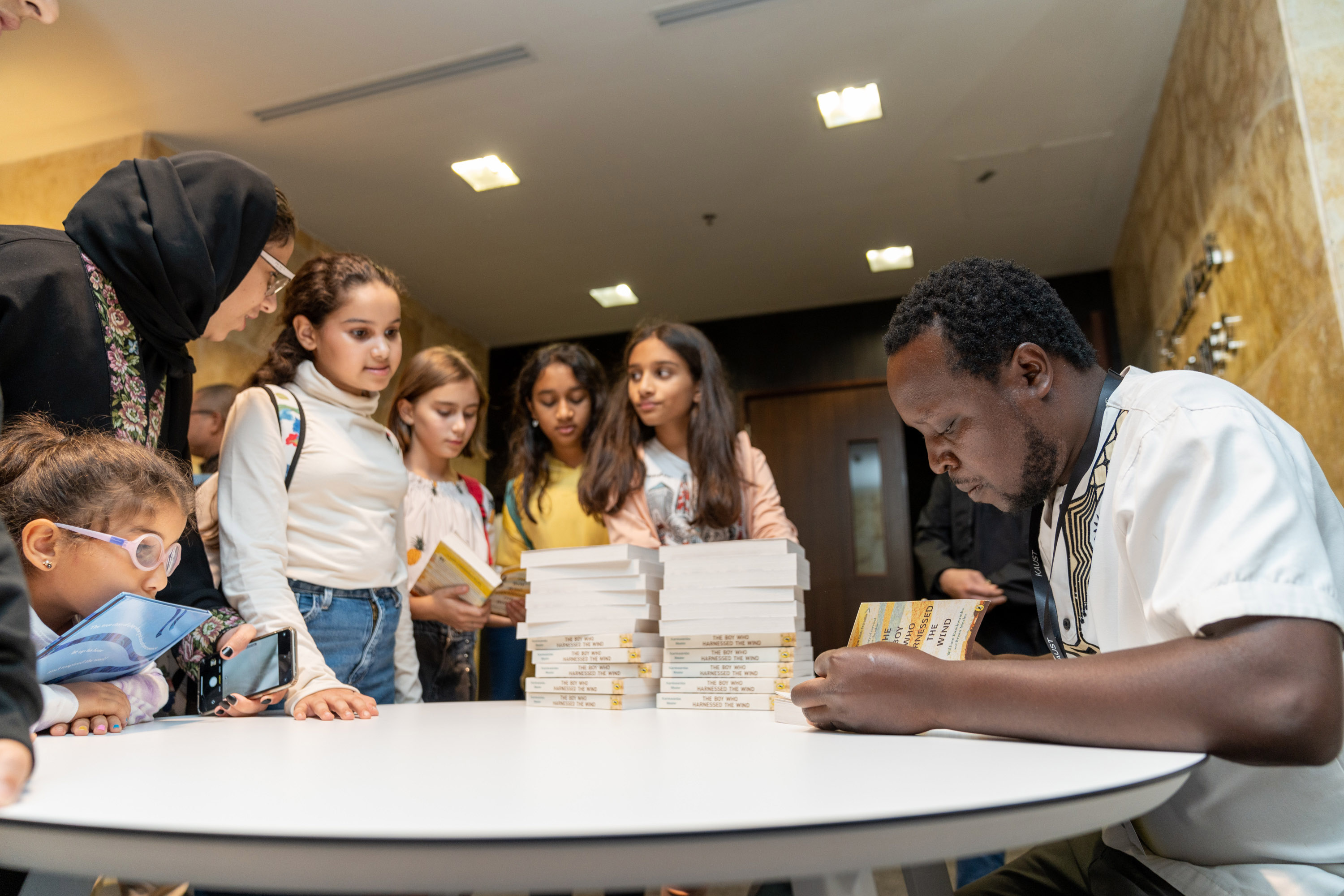
William Kamkwamba (right), author and subject of the film, The Boy who Harnessed the Wind, autographs books for eagerly waiting KAUST TKS students. Photo: KAUST
The film The Boy who Harnessed the Wind amazed audiences in an altogether different way for the real-life childhood story of Malawian William Kamkwamba, who at the age of 13 built a wind turbine to save his African village from drought and famine, determined to succeed despite extreme hurdles such as poverty, lack of food, money and education. Now an author and environmental engineer, Kamkwamba attended the event, signing books for adults and children. He especially made a profound impression on the children in the audience, evidenced by their enthusiastic questions to the author in the Q&A after the film.
Two TKS (The KAUST School) siblings in the audience had this to say about Kamkwamba and the film:
"If William was able to help his village with the limited resources that he had access to, couldn't we help more people around us with the many resources we are blessed with?"
— Pablo Finkbeiner Rivera (grade 7)
"I liked how he sneaked into the library and was able to learn just from books without going to school. And then he was able to build something so important for his village."
— Katerina Finkbeiner Rivera (grade 3)
Translating ideas into action
Provost Lawrence Carin reflected that the ideas explored throughout WEP, though not all studied in the classroom, reflect things happening in the world today that are on the edge —revolutionary ideas being translated into actions that will define the future of the world and transform lives.
As
Dr. Rafic Makki of Mubadala Capital said in the deep tech panel discussion (January 12),
"If you can dream it, if you can think it — you can make it. The future is bright when it comes to science and technology. Never doubt. Solutions will be there."
A WEP after-party capped the event with good food and music, and gave everyone an opportunity to catch up on conversation and celebrate the start of the semester. Enrichment for all. The
full WEP2023 program and archived WEP content is available online.
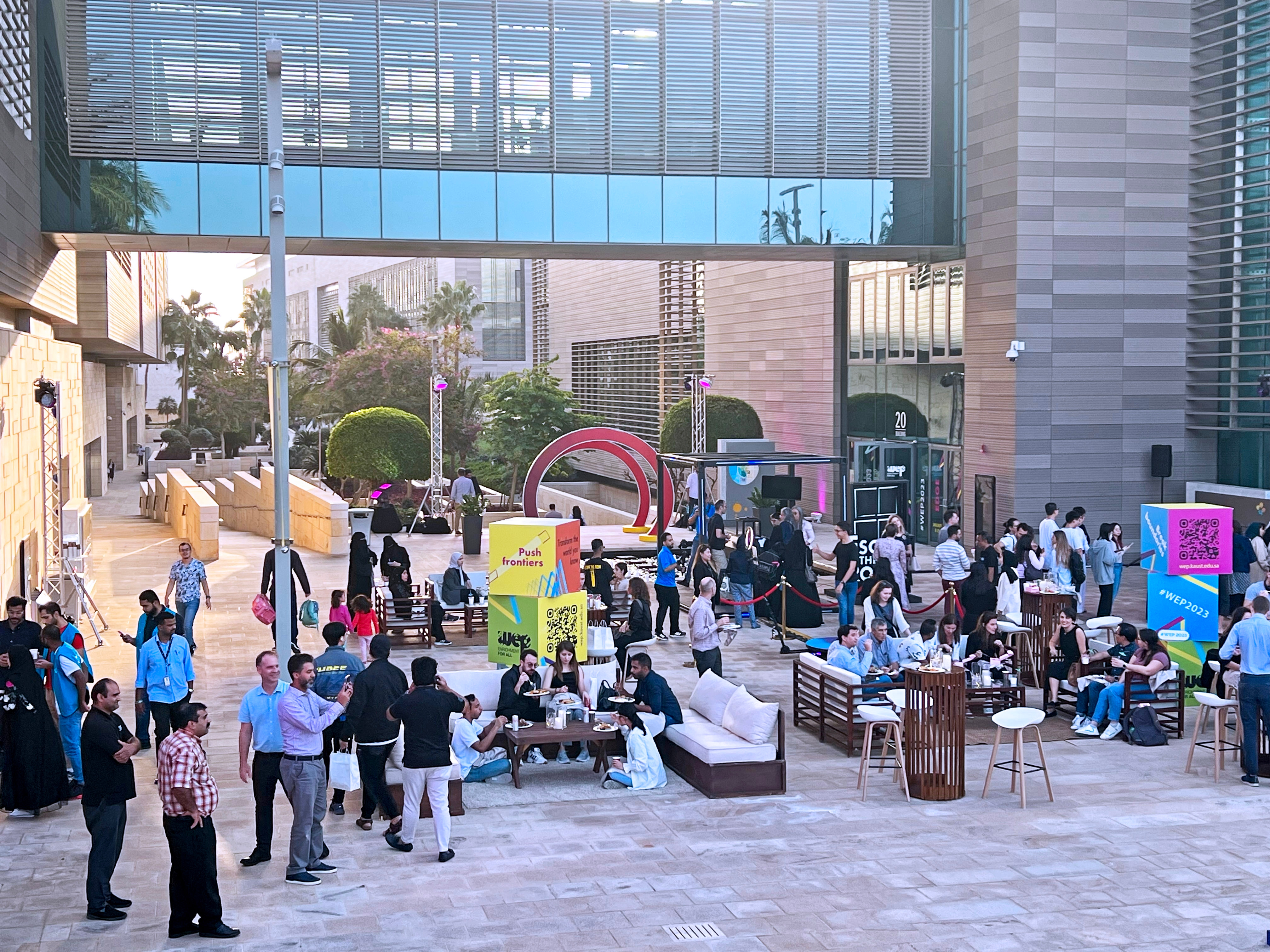
WEP23 participants celebrated the conclusion of the near two-week extravaganza at the WEP after party. Photo: JWest/KAUST

